Building on a history of successful collaboration, the Rabat and Khartoum Processes are joining forces with the Niamey Declaration to deepen their synergies through a first-of-its-kind Joint Thematic Meeting in the history of these interregional dialogues.
Taking place on 4-5 November 2025 in Lagos, Nigeria, and co-chaired by Nigeria and France, this Joint Thematic Meeting will bring together African and European partner countries and organisations to strengthen prevention, protection, and prosecution responses to migrant smuggling and trafficking in human beings.
While each Process has addressed these issues independently through various workshops and policy dialogues, discussions have consistently revealed strong convergence - both in the challenges faced and, in the priorities identified by partner countries of the Rabat, Khartoum and Niamey Processes. Their shared commitment to tackling migrant smuggling and trafficking in human beings has been repeatedly underscored, with a particular focus on enhancing operational cooperation and coordinating institutional, policy, and legal responses across countries of origin, transit, and destination. Consistent emphasis has also been placed on the need for proactive and responsive action - one that keeps up with evolving trends, the adaptive tactics of criminal networks, and the realities faced by victims and at-risk communities.
This Joint Thematic Meeting embodies this growing momentum to ensure that regional and cross-regional cooperation remains impactful in a context where migrant smuggling and trafficking in human beings are increasingly interlinked, and where effective prevention and protection efforts are essential to dismantling criminal networks and ensuring that perpetrators are brought to justice.
With this objective, the joint thematic meeting will directly advance the priorities set out under Area 4 of the Cadiz Action Plan on the “prevention of irregular migration, fight smuggling of migrants & trafficking in human beings” and specifically Objective 7 “Strengthening the capacities of relevant public institutions responsible for integrated border management, prevention and combating of smuggling of migrants and trafficking in human beings” as well as Objective 8 “Improving the protection of smuggled migrants, persons in need of international protection, and victims of trafficking in human beings.”
Prevention and Protection: Foundational Pillars to Disrupt Criminal Networks and Ensure Prosecution
Migrant smuggling and trafficking in human beings remain among the most pressing challenges along African and European migration routes. Although legally distinct, these two crimes often intersect in practice: individuals smuggled across borders may become victims of trafficking during their journey or upon arrival.
Testimonies and operational evidence point to complex and evolving links between smuggling and trafficking, marked by overlapping patterns of movement, coercion, and exploitation. Both smuggling and trafficking are highly adaptive crimes, evolving in response to societal, political, and technological changes and exploiting various situations of vulnerabilities. Broader global trends - including armed conflict, forced displacement, or climate change - are intensifying vulnerabilities, expanding both the number of people at risk and the geographical scope where these criminal activities can be perpetuated.
Smuggling routes have become increasingly interconnected and resilient, adapting rapidly to new laws, tighter border controls, and technological advances. At the same time, new trafficking patterns involving increased forced labour, forced criminality, and child exploitation are on the rise. These evolving dynamics highlight the importance of deepening our shared understanding of the risks and realities faced by people on the move and at-risk communities to ensure that prevention, protection, and prosecution efforts remain fit for purpose.
In this view, discussions will revolve four key themes that lie at the heart of effective policies and actions against smuggling and trafficking:
- Tailored prevention measures addressing the intersection between smuggling and trafficking in human beings
- Protection mechanisms that protect both victims and at-risk communities
- Coordinated prosecution strategies aligned with the Niamey Declaration
- Scaling up national and regional good practices
In addressing these topics, this Joint Thematic Meeting will serve as a stepping stone toward greater operational, institutional and policy coordination between countries of origin, transit, and destination. It will culminate with a set of joint recommendations aimed at translating dialogue into concrete actions and at ensuring that prevention, protection, and prosecution efforts remain responsive to the evolving dynamics along African and European migratory routes.






